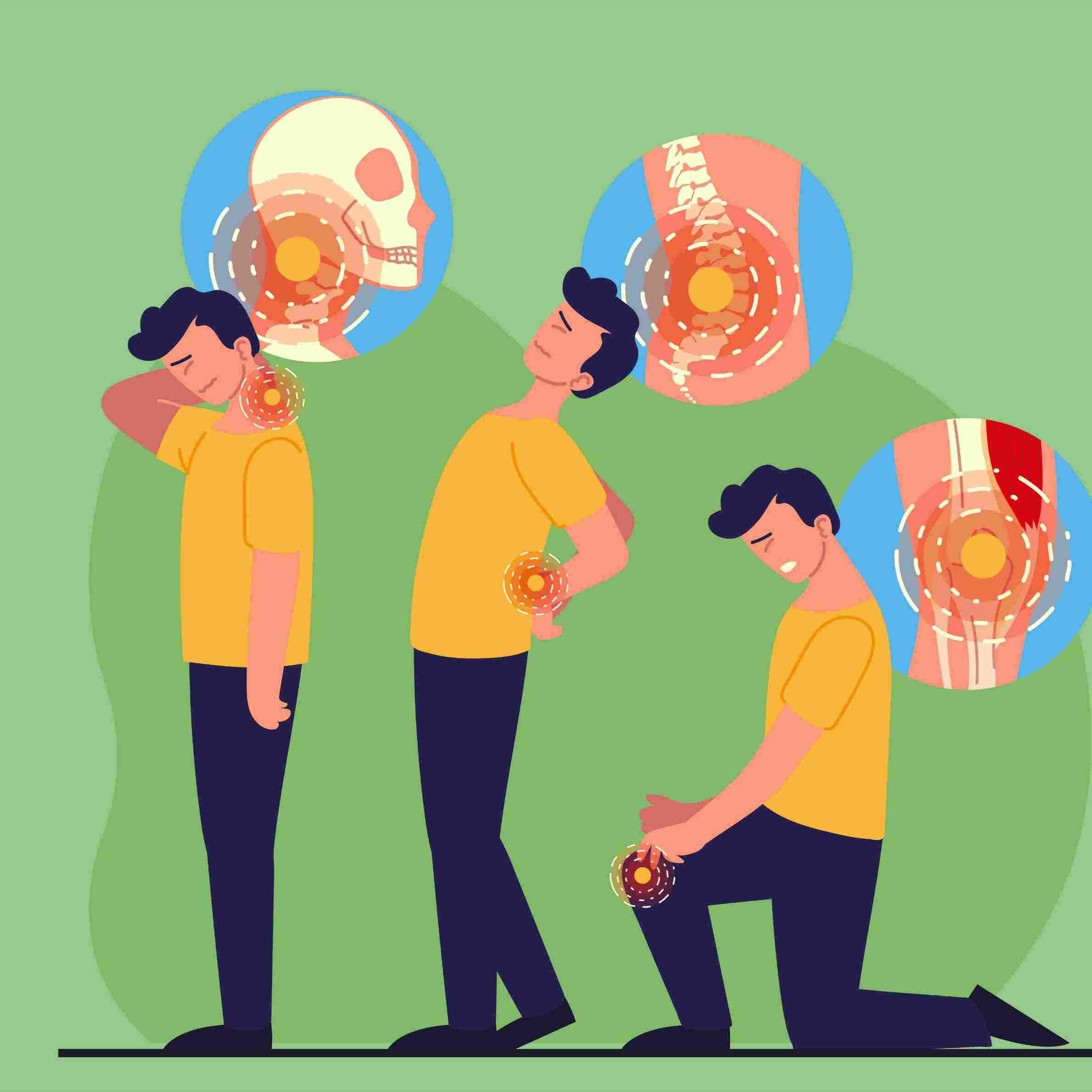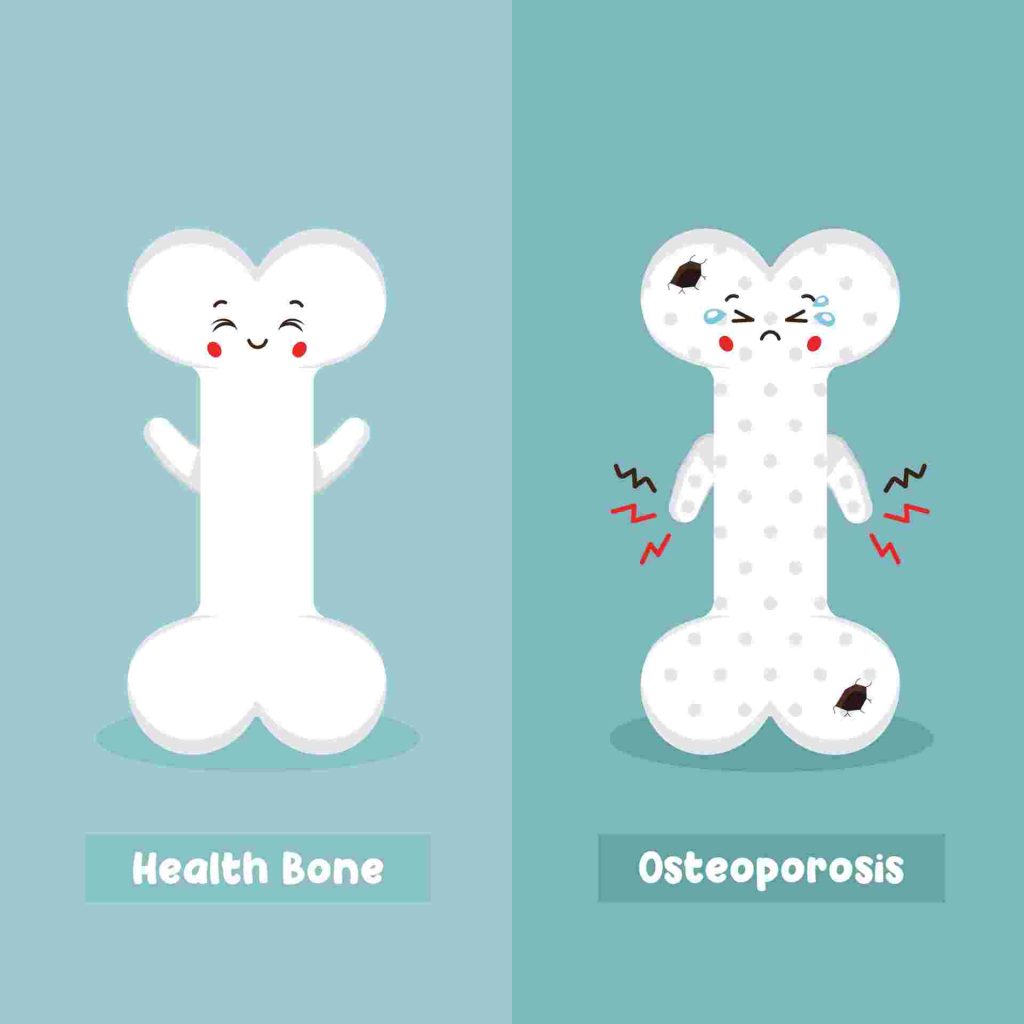
Osteoporosis is a condition that weakens bones, making them fragile and more likely to break. It develops slowly over several years and is often only diagnosed when a fall or sudden impact causes a bone fracture. Fortunately, there are many steps you can take to strengthen your bones and prevent osteoporosis. This article provides ten essential tips to help you maintain strong, healthy bones throughout your life.
Table of Contents
What is Osteoporosis?
Osteoporosis is often referred to as the “silent disease” because it can progress without any symptoms until a fracture occurs. It’s crucial to understand the risk factors and take proactive measures to protect your bone health. Osteoporosis is characterized by low bone mass and deterioration of bone tissue, leading to increased bone fragility and risk of fractures, particularly in the hip, spine, and wrist.
Risk Factors for Osteoporosis
Several factors can increase your risk of developing osteoporosis, including:
Age: Bone density peaks around age 30 and then begins to decline.
Gender: Women are more prone to osteoporosis, especially post-menopause.
Family History: A family history of osteoporosis can increase your risk.
Body Frame Size: Smaller, thinner individuals have a higher risk.
Hormone Levels: Lower estrogen levels in women and lower testosterone levels in men can weaken bones.
1. Get Enough Calcium
Calcium is a vital mineral for bone health. It helps build and maintain strong bones. Adults generally need about 1,000 mg of calcium daily, increasing to 1,200 mg for women over 50 and men over 70.
Sources of Calcium
Incorporate these calcium-rich foods into your diet:
- Dairy products like milk, cheese, and yogurt
- Leafy green vegetables such as kale and spinach
- Fortified foods like cereals and orange juice
- Fish with edible bones, like sardines and salmon
2. Ensure Adequate vitamin D Intake
Vitamin D is essential for calcium absorption in the body. Without sufficient vitamin D, your body cannot absorb the calcium you consume, leading to weaker bones.
Sources of vitamin D
You can get vitamin D from:
- Sunlight: Your skin produces vitamin D when exposed to sunlight.
- Foods: Fatty fish, liver, egg yolks, and fortified foods.
- Supplements: If you don’t get enough vitamin D from sunlight and food, consider taking a supplement.
3. Engage in Regular Weight-Bearing Exercise
Regular physical activity is crucial for maintaining bone health. Weight-bearing exercises, in particular, help to stimulate bone formation and maintain bone density.
Types of Weight-Bearing Exercises
Include these activities in your routine:
- Walking or jogging
- Dancing
- Hiking
- Strength training with weights
- Yoga and Pilates
4. Incorporate Strength Training
Strength training exercises, such as lifting weights, help to strengthen muscles and bones. These exercises put stress on your bones, prompting them to grow denser and stronger.
Effective Strength Training Exercises
Consider these strength training exercises:
- Squats and lunges
- Push-ups and bench presses
- Weight lifting and resistance band exercises

5. Eat a Balanced Diet
A diet rich in various nutrients is essential for overall health and bone strength. Focus on a balanced diet that includes a variety of foods to ensure you get all the necessary vitamins and minerals.
Key Nutrients for Bone Health
Ensure your diet includes:
- Protein: Found in meat, dairy, beans, and nuts
- Magnesium: Found in nuts, seeds, and whole grains
- Vitamin K: Found in leafy green vegetables
- Zinc: Found in meat, shellfish, legumes, and seeds
6. Maintain a Healthy Weight
Being underweight increases the risk of bone loss and fractures. Conversely, being overweight can increase the risk of fractures in your arms and wrists. Maintaining a healthy weight is crucial for bone health.
Tips for Maintaining a Healthy Weight
- Eat a balanced diet with appropriate portion sizes.
- Avoid excessive dieting or overeating.
- Engage in regular physical activity.
7. Avoid Smoking and Limit Alcohol Consumption
Smoking and excessive alcohol consumption can contribute to bone loss. Smoking decreases bone density, while excessive alcohol interferes with the body’s ability to absorb calcium.
Healthy Lifestyle Choices
- Quit smoking if you currently smoke.
- Limit alcohol intake to no more than one drink per day for women and two for men.
8. Monitor Bone Density
Regular bone density tests can help you monitor your bone health and take action if your bones start to weaken. These tests measure the density of minerals (such as calcium) in your bones.
When to Get Tested
- Women aged 65 and older, and men aged 70 and older should have regular bone density tests.
- Postmenopausal women and men over 50 with risk factors for osteoporosis should also consider testing.
9. Manage Medications
Certain medications can affect bone health, leading to an increased risk of osteoporosis. It’s essential to manage these medications carefully.
Medications to Watch
- Long-term use of corticosteroids
- Certain anti-seizure medications
- Some cancer treatments
- Proton pump inhibitors (used for acid reflux)
10. Stay Informed and Proactive
Knowledge is power when it comes to preventing osteoporosis. Stay informed about the latest research and guidelines for bone health.
Resources for Information
- Consult with your healthcare provider regularly.
- Join support groups or forums for people with osteoporosis.
- Follow reputable health organizations for updates and tips.
Conclusion
Preventing osteoporosis and maintaining strong bones requires a proactive approach that includes a balanced diet, regular exercise, and healthy lifestyle choices. By following these ten essential tips, you can significantly reduce your risk of developing osteoporosis and ensure that your bones remain strong and healthy throughout your life.
FAQs
How much calcium do I need daily to prevent osteoporosis?
Adults generally need about 1,000 mg of calcium daily, increasing to 1,200 mg for women over 50 and men over 70.
What are the best exercises for bone health?
Weight-bearing exercises like walking, jogging, dancing, and strength training are excellent for maintaining bone health.
Can osteoporosis be reversed?
While osteoporosis cannot be completely reversed, its progression can be slowed or halted with proper diet, exercise, and medications.
Is it possible to get enough vitamin D from sunlight alone?
It depends on factors like location, skin type, and lifestyle. Many people may need to supplement their vitamin D intake with food or supplements.
What foods should I avoid to maintain bone health?
Limit consumption of salt, caffeine, and alcohol as they can interfere with calcium absorption and bone health.
When should I start getting bone density tests?
Women aged 65 and older, men aged 70 and older, and those with risk factors for osteoporosis should consider regular bone density tests.

Your expertise really shines through in this article. The practical tips and insights you’ve shared are going to be very useful for my work.
I love how you’ve broken down this topic into easy-to-understand sections. The step-by-step approach you’ve taken is very helpful.
Вы новый клиент? Тогда у нас для вас особое предложение – займ под 0% без проверки кредитной истории и отказов! Получить деньги на карту могут практически все, кому уже исполнилось 18 лет. [url=https://t.me/s/mfo_2024_online]Новые МФО с займами без проверок[/url] предлагают уникальные условия для тех, кто хочет быстро и без лишних вопросов решить финансовые проблемы. Оформление займет всего несколько минут, а деньги уже через мгновение окажутся на вашей карте.
his response https://galaxyswapper.ru/
[url=https://sovagg.org]сова гг обменник[/url] – сова гг обменник, сова гг обменник
news [url=https://infinitowallet.pro/]infinito wallet[/url]
visit their website [url=https://counterwallet.info/]counterwallet[/url]
подробнее [url=https://Kraken21att.net/]kraken21.at[/url]
[url=https://kraken8tor.com/]кракен зеркало тор[/url] – кракен даркнет в тор, кракен тор ссылка
[url=https://kraken16at.co/]kraken 17at[/url] – кракен москва, kraken 12at
check out this site [url=https://fillersmarket.com/product/bellast-soft-l/]Bellast Soft L[/url]
[url=https://poisk-lekarstv.su/lekarstva/mounjaro/]тирзепатид купить цена[/url] – оземпик купить +в красноярске, таблетки +для похудения семаглутид
read the article [url=https://martianwallet.at/]martianwallet login[/url]
a fantastic read [url=https://rabby.at/]rabby extension[/url]
[url=https://t.me/ozempik_kupit_moskva/]саксенда инструкция +по применению цена отзывы аналоги[/url] – купить аземпик, мунжаро +для похудения
More hints [url=https://infinityvvallet.io/]infinity walletAds[/url]
Последние новости https://ua-novosti.info Украины и мира, политические и аналитические статьи, курсы валют, индексы и котировки, интервью, мнения, бизнес новости
найти это https://mg1.to
найти это https://mega555-moriarti.com
Hello,
I am Husam Orabi, Qatari Investors Group’s chief business development and delivery officer. We offer loans and credit facilities at a small interest rate for ten years and a moratorium of up to two years.
We also finance profit-oriented projects and businesses. We understand that each business is unique, so let us know what you need for your business, and we will tailor our financing to suit your specific requirements.
Regards,
Husam Orabi
CHIEF BUSINESS DEVELOPMENT & DELIVERY OFFICER
Mobile: +971524239312
Whatsapp: +971524239312
husam@qatarinvestors-group.com
visit the site [url=https://breadwallet.io/]brd wallet[/url]
посмотреть в этом разделе [url=https://r7casino.io/]R7 casino зеркало сайта[/url]
[url=https://kg.ndt.su]пенетрант для контроля[/url] – водосмываемый пенетрант, водосмываемый пенетрант
[url=https://az.ndt.su]дефектоскопист по ультразвуковому контролю[/url] – контрастный грунт, купить магнитный дефектоскоп
[url=https://by.ndt.su]черная суспензия[/url] – пенетрант для сварных швов купить, разъем для рентгеновского аппарата
смотреть здесь https://1win-play-game.space/1win-soccer-solo-striker/
пояснения https://pinup-play-game.space/ru/jetx-crash-game-about-an-airport-from-which-a-plane-takes-off/
перенаправляется сюда https://onlinecrashgame.space/spaceman/
learn this here now https://pinup-play-game.space/cash-it-crash-game-with-a-potential-win-multiplier-of-x5000/
find https://onlinecrashgame.space/en/doodle-crash/
Hi, I heard that a new platform will be opened. I think it was called AFDAS (America’s First Digital Asset Society). Has anyone heard? Please share the link.
New platform launch AFDAS, [url=https://statistic2024.com/]Asset society AFDAS[/url], AFDAS
Последние новости https://useti.org.ua бизнеса и финансов, новости политики, эксклюзивная аналитика и советы экспертов
[url=https://kg.ndt.su]крепления рентгеновских аппаратов паук у[/url] – пенетрант для контроля сварных купить, контрастный грунт
[url=https://kz.ndt.su]пенетрант купить[/url] – набор для капиллярного контроля, контактная жидкость для ультразвукового контроля
[url=https://az.ndt.su]магнитный держатель для рентгенпленки[/url] – капиллярный контроль, ультрафиолетовый фонарь купить
[url=https://by.ndt.su]контрастный грунт[/url] – черная магнитная суспензия, ультрафиолетовый фонарь купить
[url=https://prompolimerplast.ru/testovaja-statja/]производители полимерной продукции[/url] – фрезеровка листового металла, формовка пластика на заказ
[url=https://xn--80adidt0bv.su/striptiz-klub-izhevsk-kruzheva]стриптиз приватный танец[/url] – кружева png, танцовщицы из кружева
[url=https://uralteh.ru/catalog/kranyi-mostovyie/kran-mostovoj-elektricheskij-odnobalochnyij-podvesnoj-odnoproletnyij-u]кран мостовой 20т[/url] – кран мостовой 5, крановое оборудование
[url=https://Megaweb4.io/]mega даркнет рабочая ссылка[/url] – mega даркнет вход, мега даркнет рабочее зеркало
[url=https://kra04.gl/]kraken casino[/url] – kraken market, маркетплейс кракен kraken darknet top
[url=https://Kra2cc.at/]кракен магазин[/url] – кракен официальный сайт, где найти ссылку кракен
[url=https://Mg2.gdn/]мега darknet[/url] – мега даркнет рынок, мега ссылка тор
Hello! I heard a new platform might be launching soon, and I think it’s called AFDAS (America’s First Digital Asset Society). Has anyone else heard of it? If you have the link, please share.
Digital asset platform AFDAS, [url=https://statistic2024.com/]New digital platform v[/url], New platform launch AFDAS
[url=https://kra115.cc]kraken вход[/url] – kraken darknet, как зайти на kraken
[url=https://bs21site.cc]blacksprut зеркало[/url] – blacksprut gl, blacksprut com что за сайт
+ Больше не испытываете эмоций
+ В конфликте с родителями, общение холодное или
его нет вовсе
+ Больше не испытываете эмоций
+ Испытываете эмоциональное и/или физическое выгорание
+ Испытываете эмоциональное
и/или физическое выгорание
+ Испытываете эмоциональное
и/или физическое выгорание
+ Больше не испытываете эмоций
+ В конфликте с родителями, общение холодное или его нет вовсе
+ В конфликте с родителями, общение
холодное или его нет вовсе
+ Делаете результаты через преодоление и страдания
+ В конфликте с родителями, общение
холодное или его нет вовсе
+ Не можете построить долгие отношения, проще без них, партнёры всё время не те
+ Одиноки, нет друзей и сложно строить отношения с людьми
+ Тащите всё на себе, нет времени на жизнь
+ Чувствуете, что страсть и любовь
ушли из отношений
https://t.me/s/psyholog_online_just_now